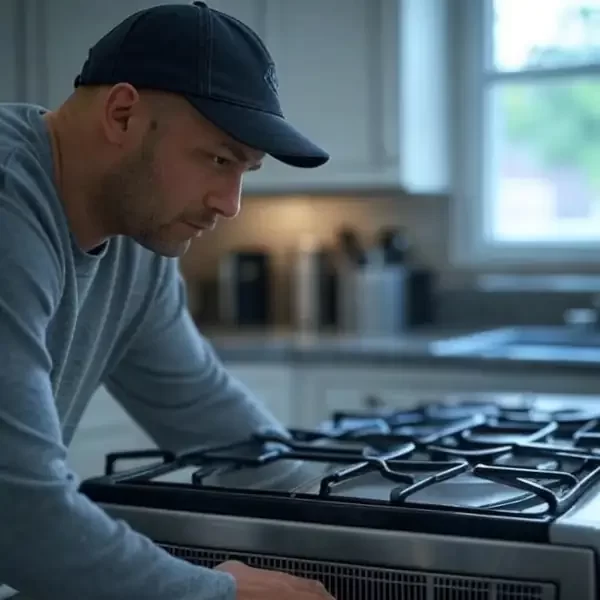
Are you a tenant living in a property with gas appliances? Then understanding Gas Safety 101 is absolutely crucial for your well-being. From your heating system to your cooktop, gas appliances are common in many homes, offering convenience and efficiency. However, they also come with inherent risks if not properly maintained or if a leak occurs. This guide will walk you through what you need to know about gas appliances, how to spot the signs of a gas leak, and what immediate actions to take to keep yourself and your household safe.
Your Gas Appliances: A Gas Safety 101 Overview
Most rental properties in Australia with gas connections will have a variety of appliances, including:
Gas Heaters: Wall-mounted, freestanding, or ducted systems.
Gas Hot Water Systems: Instantaneous or storage tank types.
Gas Cooktops and Ovens: Common in kitchens.
Gas Barbecues (often connected to the main gas supply): Found in outdoor entertaining areas.
It’s vital that all gas appliances in your rental property are installed, maintained, and serviced by a licensed gas fitter. Landlords have a responsibility to ensure these appliances are safe and in good working order.
Why Gas Safety Matters: Understanding Carbon Monoxide & Gas Safety Basics
One of the biggest dangers associated with faulty gas appliances or gas leaks is carbon monoxide (CO) poisoning. Carbon monoxide is a silent killer – it’s an invisible, odorless, and tasteless gas produced when fuels like natural gas don’t burn completely. Symptoms of CO poisoning can be subtle and easily mistaken for other illnesses, including:
Headaches
Dizziness
Nausea and vomiting
Weakness and fatigue
Shortness of breath
Confusion or disorientation
In severe cases, CO poisoning can lead to unconsciousness and death. This underscores the importance of being vigilant about Gas Safety 101.

Identifying a Gas Leak: Essential Gas Safety 101 Alarms
Knowing how to identify the signs of a gas leak is paramount for Gas Safety 101. Your senses are your best tools here:
Smell: Natural gas is odorless on its own. Gas companies add a chemical called mercaptan to it, which gives it a distinctive, strong smell, often described as rotten eggs or sulfur. If you smell this, it’s a strong indicator of a leak.
Sound: A hissing or whistling sound near a gas line or appliance could indicate gas escaping.
Sight:
Bubbles in water: If you see bubbles in puddles or wet areas near a gas line, it could be gas escaping.
Damaged gas pipe: Visible damage to a gas pipe or connection.
Dying vegetation: Patches of dead or discolored plants or grass over or near a gas pipeline.
Physical Symptoms (from carbon monoxide): As mentioned above, unexplained headaches, nausea, dizziness, or fatigue could be a sign of CO poisoning due to an incomplete gas burn or leak.
What to Do If You Suspect a Gas Leak (And What NOT to Do!)
Immediate action is crucial if you suspect a gas leak. Remember these critical steps for Gas Safety 101:
DO:
-
Evacuate immediately: Get everyone, including pets, out of the property as quickly as possible.
-
Open windows and doors (if safe to do so on the way out): This can help to ventilate the area, but do not linger.
-
Turn off the gas supply (if safe and accessible): If the main gas shut-off valve is easily accessible and it’s safe to do so, turn it off as you leave.
-
Call 000 (emergency services) from a safe distance: Once you are outside and away from the property, call emergency services.
-
Contact your landlord or real estate agent: Inform them immediately about the suspected gas leak.
DO NOT:
-
Do NOT turn on or off any light switches or electrical appliances: A spark could ignite the gas.
-
Do NOT use your mobile phone inside the property: Again, a spark could be generated.
-
Do NOT light matches, lighters, or any open flames.
-
Do NOT re-enter the property until emergency services deem it safe.
-
Do NOT try to find the source of the leak yourself or attempt to fix it.
Your Rights and Responsibilities as a Tenant
As a tenant, you have rights when it comes to gas safety:
Your landlord is responsible for ensuring all gas appliances are in a safe condition and are regularly serviced by a licensed professional.
You have the right to a safe living environment.
Your responsibilities include:
Reporting any concerns about gas appliances or suspected leaks to your landlord or agent promptly.
Ensuring you use gas appliances according to the manufacturer’s instructions.
Never tampering with gas appliances or connections.
Key Takeaway for Gas Safety 101
Gas Safety 101 isn’t just a guideline; it’s a vital aspect of living safely in a rental property. By being aware of your gas appliances, understanding the signs of a leak, and knowing exactly what to do in an emergency, you can significantly reduce risks. Don’t hesitate to report any concerns to your landlord – your safety is always the priority. Stay safe and informed!
- Ready to comply with Victoria’s rental laws? Book your gas check for $220 + GST

